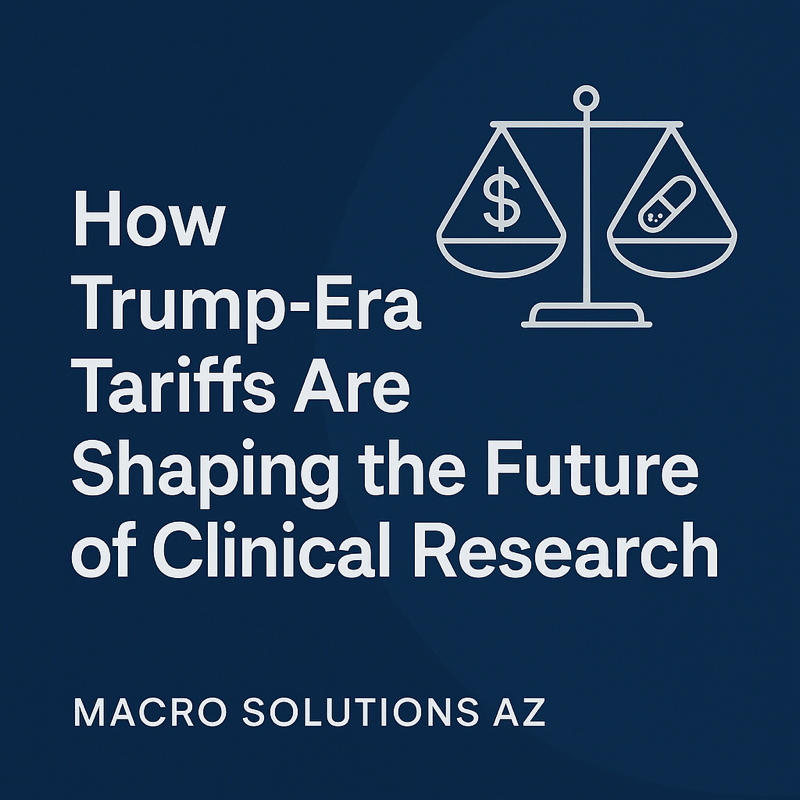At Macro Solutions AZ, we closely monitor the financial forces shaping clinical research—and one area that has quietly but powerfully influenced the sector is international trade policy. In particular, tariffs introduced during former President Trump's administration have created ripple effects across the biotech and pharmaceutical industries, altering everything from trial budgets to drug availability.
Tariffs and the Rising Price Tag of Research
One of the most direct impacts of these trade policies is increased cost pressure on research sponsors and clinical sites. Many investigational products, lab materials, and medical devices used in trials are manufactured overseas. When import tariffs were expanded to include materials from key partners like China and the EU, the cost of acquiring these essentials rose—sometimes dramatically.
This has led to new financial stress for clinical trials already navigating tight margins. Smaller research operations, which don't have large purchasing power or in-house manufacturing, are especially vulnerable to these cost hikes. Trials that once operated comfortably within budget may now need mid-study amendments, contract renegotiations, or even contingency funding to stay on track.
Supply Chain Delays and Site-Level Disruptions
Beyond cost, tariffs have also contributed to logistical complications. Customs procedures tightened, paperwork increased, and certain shipments have faced significant delays. These bottlenecks are particularly concerning in time-sensitive studies—especially those that rely on perishable biospecimens, temperature-sensitive drugs, or tight visit windows.
For research coordinators and site managers, these holdups can derail timelines, create scheduling chaos, and impact protocol compliance. At Macro Solutions AZ, we've seen how financial tracking must now account for unexpected storage fees, reshipping costs, and resource realignment due to these interruptions.
Domestic Manufacturing: Long-Term Promise, Short-Term Risk
While the goal of reshoring pharmaceutical production may sound ideal in theory—promoting job growth and domestic control—its real-world rollout is far from immediate. Many U.S. biotech companies are deeply embedded in global supply chains. Rapidly pivoting to U.S.-based production requires time, regulatory clearance, new partnerships, and capital investment—none of which resolve urgent operational needs.
As a result, some companies have responded to tariffs by pausing or canceling trials altogether, waiting for either supply chain relief or greater certainty in U.S. trade policy. These decisions impact research pipelines, site revenue streams, and the broader advancement of new therapies.
Tariffs and Drug Availability: A Compounding Issue
Another critical outcome of these tariffs is the threat of drug shortages. With many finished medications—or the raw materials used to make them—originating overseas, added import fees have caused some suppliers to withdraw from the U.S. market or reduce supply volumes. While clinical trials don't always rely on commercial drugs, shortages can affect comparator arms, rescue medications, or supportive care treatments that must be available during the trial.
This is particularly dangerous for oncology and rare disease trials, where delays can directly impact patient outcomes. If clinical sites cannot reliably access needed therapies, enrollment stalls and participants may suffer from treatment interruptions or limited access to investigational care.
What This Means for Clinical Research Finance
Financial professionals managing trials must now factor trade volatility into both forecasting and real-time decision-making. Tariff-induced inflation isn't always obvious—it can show up in vendor pricing, contract terms, or hidden administrative delays. The best-prepared sites are those that build flexibility into their budgets and remain aware of shifting global pressures.
At Macro Solutions AZ, while we don't track tariff trends specifically, we continuously monitor the broader global and economic forces impacting clinical research operations. This includes identifying indirect cost increases, delays, and risk factors that may disrupt financial performance at the site level.
Conclusion: A New Era of Global-Aware Clinical Finance
The Trump administration's tariffs weren't aimed specifically at clinical research, but their influence has made its way into nearly every step of the trial lifecycle. From higher material costs to unstable drug pipelines, clinical sites and sponsors are learning to adapt. The industry's future depends on how well we manage these external pressures—and how effectively we can forecast the financial realities of a globally intertwined research model.
If your site is struggling with the hidden costs of trade policy, Macro Solutions AZ is ready to help. Let's future-proof your financial systems—because in modern research, every dollar and every delay counts.
References
- Clinical Leader. "The Potential Impact of U.S. Tariffs on the Biotech Sector."
- Clinical Trials Arena. "Trump's Tariffs Will Trickle Down the Clinical Trial Chain."
- Pharmacy Practice News. "Trump Tariffs: Pharmaceutical Impact."
- Cancer Therapy Advisor. "Pharmaceutical Tariffs and Drug Shortages."


